Felipe Maraña Marcos, journalist and professor at the University Complutense of Madrid, reflects on this article on the rise of Islamophobia in Spain and the pillars this hate crime has historically relied on.
“Over the centuries, there has been an incessant struggle in Spain’s imagination between ‘Maurophobia’/Islamophobia and ‘Maurophilia’/ Islamophilia which, to date, has settled on the overriding negative image of Muslims in general and Moroccans in particular (Arabians, Arabs, Moslems, Saracens, Mohammedans, Berbers, Turks, Moors, Maghrebis, Islamists, and so on)”.
Until very recently, this struggle, described by professor Eloy Martín Corrales in the journal CIDOB d’Afers Internacionals in October 2004, was barely acknowledged in Spain, despite the countless references substantiating it in Spanish history and literature.
In Spain the Muslim has been demonised as the main domestic enemy from the 8th century, with the arrival of Muslims on the Iberian Peninsula, to the present day; until 1492, across eight centuries of evil coined the Reconquista; in the hundred years that followed with the confrontation between the Spanish Empire and the Ottoman Empire in the name of Christianity, until the Battle of Lepanto in 1591; for the three subsequent centuries of war with Muslim corsairs, or pirates, in the Mediterranean, until Spain’s Treaty of Peace with Tunis in 1791; and over the past two centuries, which have been peppered with conflicts with Morocco.
The main cause of the conflicts between Spain and its southern neighbour comes from Spanish-occupied territories in North Africa and the inevitable friction between two neighbours separated by one of the widest political and cultural gaps and per capita income (10:1) anywhere on the planet.
The shared threat of terrorism by Al Qaeda, Daesh and their franchises in Maghreb since 9/11, the common alliance with the United States and the strong bilateral economic, legal and police ties established over the past 30 years has eased the historical tensions and Islamophobia stemming from these tensions. They have not disappeared altogether, however.
A tolerant and democratic consolidation
With the death of Franco in 1975 and democratic consolidation, new values of solidarity and tolerance took root, and chiefly in the media, on school curriculums and in political discourses there has been the eradication of the most offensive and hostile reference towards Muslims and Muslim immigrants in Spain, around a third of whom have arrived since migrants started to be imported, not exported, in the 1990s.
This spirit of tolerance was bolstered through the traditional amity between Spanish governments – under Franco’s dictatorship and with the monarchy that has succeeded it at the head of State – and the main Arab regimes through Spain’s mass support of the Palestinian cause (the Palestinians have been the beneficiaries of Spanish development aid for some time) and the equally mass rejection of the invasion of Iraq in 2003, despite Spanish president, José María Aznar, in power from 1996 to 2004, being Europe’s biggest defender of George Bush in the invasion, along with Tony Blair.
Millions of Spaniards still believe that the terrorist attacks on 11 March 2004, one of the worst to date on European soil were largely the result of direct retaliation by Muslim extremists over Aznar’s support of Bush.
Millions of Spaniards still believe that the terrorist attacks on 11 March 2004, one of the worst to date on European soil (190 dead and 2,000 injured) were largely the result of direct retaliation by Muslim extremists over Aznar’s support of Bush. One of Spain’s leading experts in this case, professor Fernando Reinares, refutes this claim.
Across dozens of texts, videos and audio pieces, the leaders of Al Qaeda and later Daesh have justified including Spain among their terrorist targets, considering it ‘occupied land’ (their idealised al-Andalus in classical Arabic), due to the ties with Israel that have grown since 1986 and/or commitments as a loyal ally to the US and the major European powers of NATO and the EU.
In fact, Spain has participated in all foreign operations by the EU, and almost every one by NATO, over the last twenty years. For the propaganda of Muslim extremists this is reason enough to justify attacks such as 11M in Madrid in 2004 and the attacks in Catalonia in 2017. Each attack has been followed by cases of mounting Islamophobia in Spain, although fewer than in the United States after 9/11, in the UK after 7/7 in London, and in France in 2012 after the Charlie Hebdo shooting in Paris and the attacks in Nice and Nantes.
A rise in Islamophobia
In its last quarterly report, corresponding to the period from October to December 2018, the Observatory of Islamophobia in the Spanish Media analysed articles written by Spanish journalists and two of Spain’s biggest newspapers, El País and La Razón, and the two biggest news agencies, EFE and Europa Press, in their digital editions.
With eight terms (Islam, Muslim(s), Jihad, Jihadism, Jihadist, Islamism, Islamist and Islamophobia) and eight indicators by the Runnymede Trust (based on the effects of the article), researchers have concluded that almost one in every four news articles on Islam published in Spain is still Islamophobic.
The level of Islamophobia is more conspicuous in the agencies than in the newspapers and in news articles than opinion pieces, and swells in the conservative press (La Razón) and escalates in the news and/or related images – in this order – with references to radicalisation, terrorism, veils, refugees and women.
Attacks on the streets
The problem, however, is not only in the wording. In 2017, the Citizen Platform Against Islamophobia in Spain detected 573 Islamophobic attacks (cases or incidents, it calls them) in the whole country. Catalonia, with 51 cases (31.8%), was at the top, followed by Andalusia with 22 cases (13.7%), the Community of Valencia with 20 cases (12.5%), and Madrid with 17 cases (10.6%).
No two Spanish media outlets are the same, nor are two territories or Regional Communities. On television, reporting is worse than in the written press and in the most conservative media and on social media it is much worse than in traditional media.
On television, reporting is worse than in the written press and in the most conservative media and on social media it is much worse than in traditional media.
Of the 269 reports of cyber-hate analysed by the Platform in 2017, the majority (135) were made on Facebook (100), Twitter (12), WhatsApp (11) and YouTube, (5), Change.org (4), ForoCoches (2) and Instagram (1). Yet this is just the tip of the iceberg given that a mere fraction of the cases of cyber-hate on social networks are reported.
In the presentation of the report, Bárbara Ruiz Berajano, in charge of the Platform’s International Relations, summarised the serious problems of Islamophobia in the Spanish media under five headings:
- Growing Islamophobic bias among leaders of political parties or groups, particularly the extreme right and neo-nazis.
- A constant stream of mosque attacks.
- Campaigns organised against mosque openings.
- Increased Islamophobia against women.
- An escalating discourse denying the historical legacy of Islam in Spain.
If the standards of major news outlets’ main style guides were upheld, a large part of the problem would be solved. With better training for journalists, sources that are larger in number and more diverse, less confusion between information and opinion, a better filtering system and the verification of truth in texts and images, and the closer cooperation between civil and political institutions we would all be better off. Today the same networks facilitating multiplied Islamophobic attacks offer digital tools for effectively fighting against them, but very few make use of them.
Felipe Maraña Marcos (Pen name: Felipe Sahagún) is a journalist and editorial advisor to El Mundo newspaper in Spain and professor of International Relations at the Complutense University of Madrid.
Source: Ethical Journalism Network

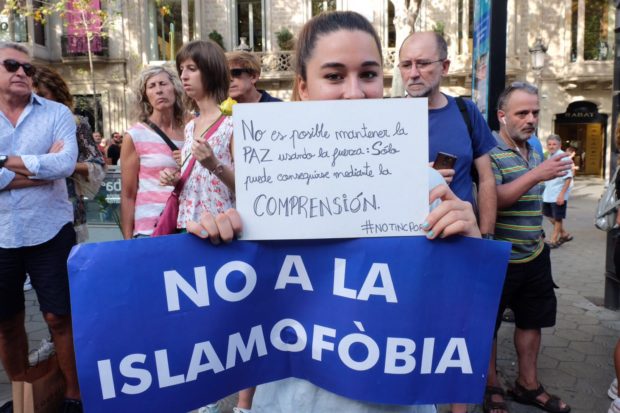
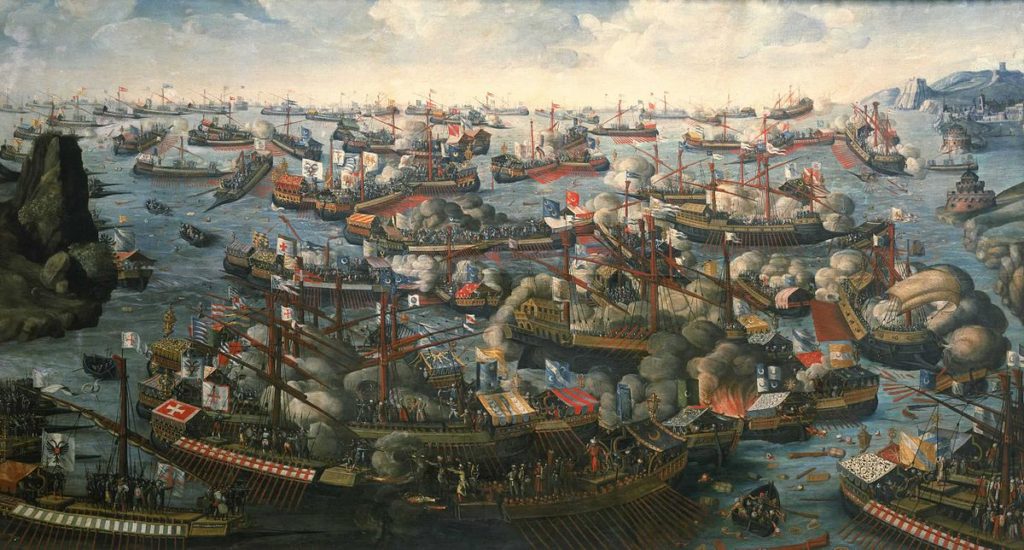
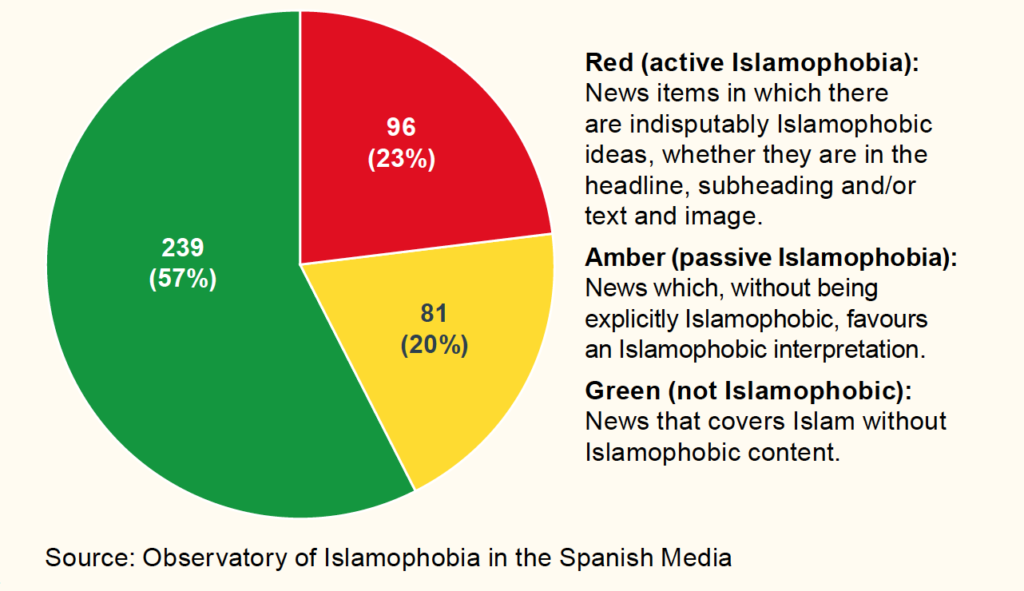
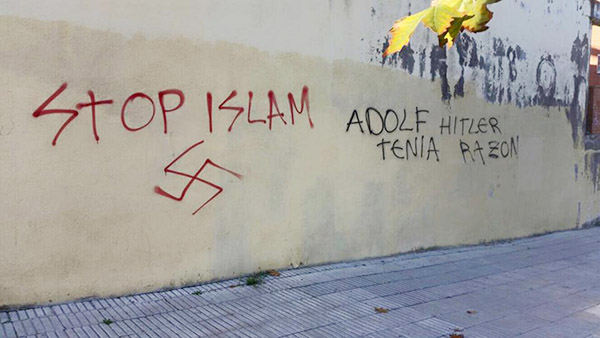

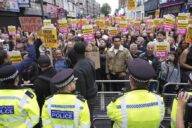











No Comments